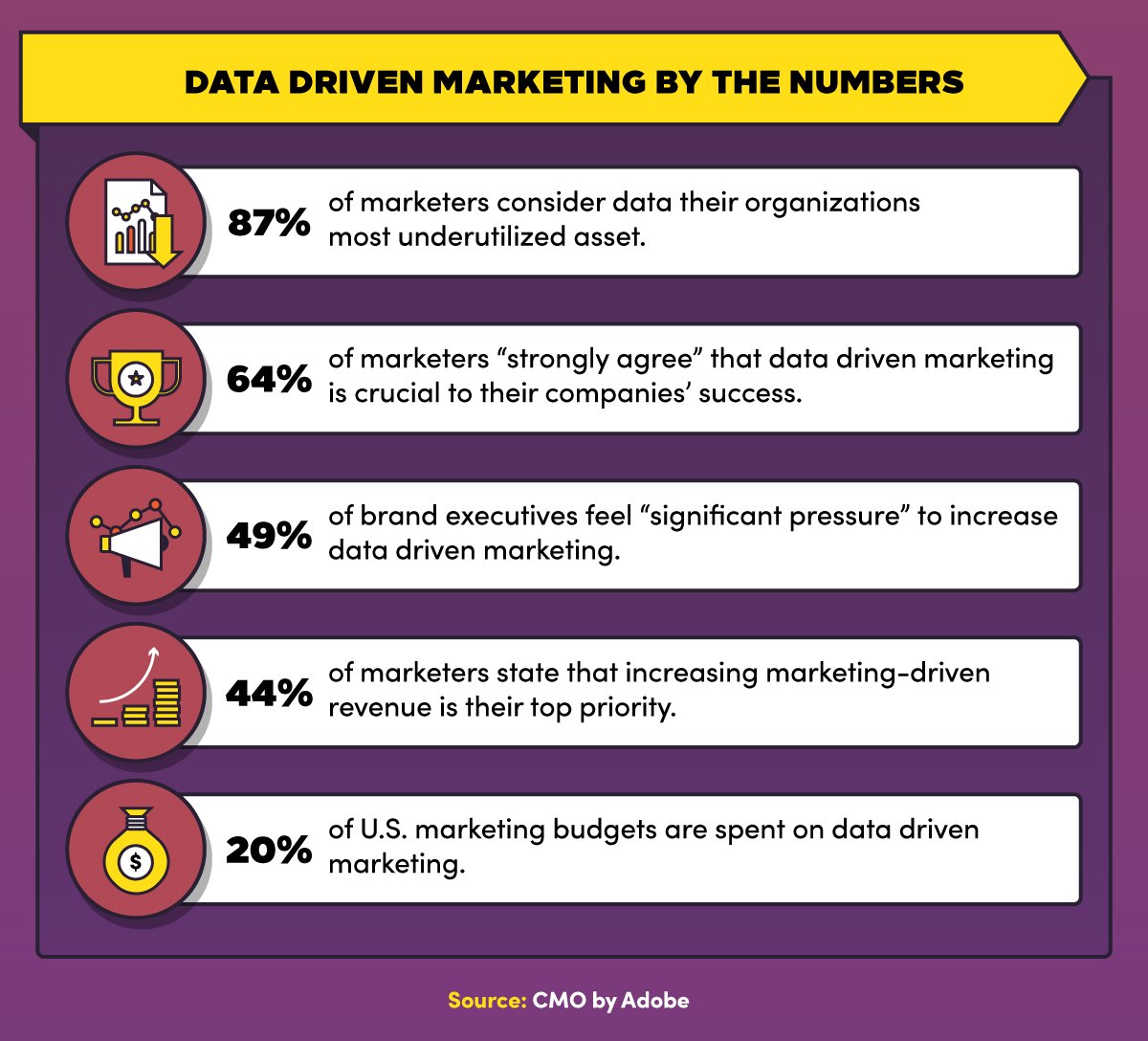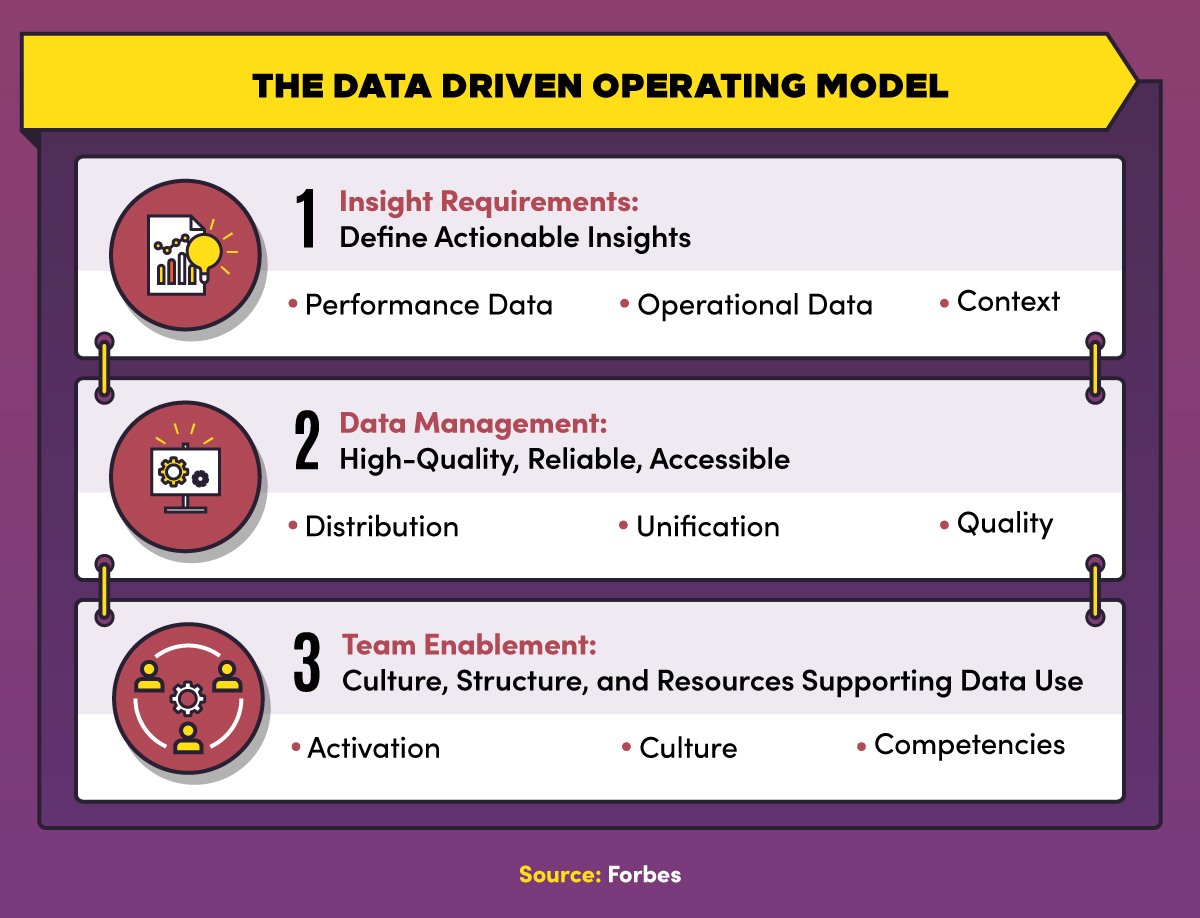Data-driven marketing has proven to be one of the most effective ways to market a business in recent years.
Technology has made it easier than ever to collect data from a variety of sources and analyse it in real time, or after the fact, which translates into being able to effectively make informed decision and create actionable insights. This helps marketers deliver more relevant messages to customers and drive new growth for the business.
Data-driven strategies are vital for success in today’s marketplace, because it allows businesses to target their customers with relevant content that resonates with them the most. It also enables businesses to track the success of their campaigns and make necessary adjustments in order to continuously improve their performance.
By understanding how data-driven marketing works and using the correct approach, your business can reach new heights by maximising your marketing performance. In this article we will explore data-driven marketing and how you can use it to your advantage.
What Is Data-Driven Marketing?
Data-driven marketing is the process of using data from a variety of sources to make informed decisions about what content to produce, when and where to publish it, and which channels to use in order to reach potential customers more effectively. The data can come from a number of sources including website and social media analytics, email marketing data, and customer data such as their buying habits.
These insights can be used to understand how customers interact with a brand, identify which channels are most effective in reaching them, and determine what content is most likely to resonate. Armed with this information, marketers can create highly targeted campaigns that produce better results.
The main difference between data-driven marketing and traditional marketing is that you can make much more precise decisions based on insights gleaned from data, rather than hunches or intuition. The main advantage here is that making strategic decisions can be done using verifiable evidence, which can lead to better results.
How Is Data-Driven Marketing Used?
There are a lot of different ways data-driven marketing can be used, but some of the most common applications include A/B testing, personalisation and targeting.
A/B testing helps to compare two versions of a campaign to see which one performs better. One of the main advantages of using A/B testing is that you can learn which version of your campaign works the best without taking up additional resources and avoiding unnecessary risk.
Personalisation ensures that each customer receives a unique experience tailored specifically for them. A staggering 99% of marketers say that personalisation is an excellent way to advance customer relationships, so it’s a very important aspect of data-driven marketing (Hubspot). This could hardly be any more accurate, as surveys have showed that more than 70% of consumers feel frustrated when their shopping experience is impersonal (Forbes).
Finally, targeting allows businesses to reach out to specific groups or segments of customers that are most likely to be interested in their product or service using specific channels and content. You can segment the customers by their demographics, interests, buying habits and more.
All of these applications are important for getting the most out of data-driven marketing. However, data-driven marketing is not a one size fits all solution, so it’s important to create a strategy that is tailored to your specific business. This starts by understanding what data is available in the first place and how it can be used to improve your marketing efforts. Following this, you need to decide which channels are the best fit for your business and create content that resonates with your target audience specific to those channels.
What Is An Example of Data-Driven Marketing?
Amazon is one of the best examples of data-driven marketing, showcasing the impact of data-driven marketing in the e-commerce industry.
The process of leveraging customer data to personalise product recommendation begins with the extensive collection of customer data, including purchase history, browsing behaviour, and even user reviews. They then use advanced data analytics and machine learning algorithms to dissect this data, identifying patterns and trends unique to each user. Using these insights, Amazon generates highly personalised product recommendations for individual customers, displayed prominently in a “Recommended for You” section on its platform. These recommendations are not static but dynamically updated in real-time as customers interact with the site.
Amazon extends this personalised approach to email marketing, remarketing, and cross-selling, ensuring customers encounter tailored product suggestions across various touchpoints. This data-driven strategy enhances customer engagement, increases sales, and contributes to lasting customer loyalty.
Why Is Data-Driven Marketing Important?
Data-driven marketing is important because it allows businesses to make better strategic decisions based on data rather than intuition. This leads to more effective campaigns that reach the right customers and produce better results.
In addition, data-driven marketing is important because it helps businesses understand their customers better. By understanding what content resonates with them, where they come from, and how they interact with a brand, businesses can create a more personalised experience for each customer. This not only improves the customer’s experience, but also increases the likelihood that they will return in the future and recommend your business to others.
And the importance of data-driven marketing amongst consumer has never been greater, with more than half (56%) preferring news and media platforms to personalise the content they receive based on their interests, tastes and online activity. The figures are even higher in younger audiences, with Gen Z (70%) and Millennials (71%) being the most interested in seeing personalised content (The Harris Poll).

What Are The Benefits of Data-Driven Marketing?
The benefits of data-driven marketing are centred around the ability to better leverage data and analytics for growth. Companies can make more informed decisions and create more targeted and effective marketing strategies.
Here are 12 key benefits of data-driven marketing:
1. Improved Decision-Making
Data-driven marketing provides valuable insights into consumer behaviour, preferences, and trends. Marketers can use this data to make informed decisions about product development, pricing, messaging, and campaign optimisation.
2. Increased ROI
Businesses can allocate their resources more efficiently when marketing efforts are guided by data. This means spending money on strategies and channels that are more likely to yield positive returns, ultimately increasing the return on investment (ROI) on the marketing spend.
3. Personalisation
Data allows for the creation of highly targeted and personalised marketing campaigns. It makes it easy for businesses to segment their audience based on various criteria and deliver tailored messages and offers, which often result in higher engagement and conversion rates.
4. Better User Experience
Data-driven marketing enables businesses to anticipate customer needs and deliver a seamless and personalised user experience across various touchpoints. This is likely to improve customer satisfaction and loyalty over time.
5. Cost Efficiency
By optimising marketing campaigns based on data insights, businesses can reduce wasted ad spend and marketing costs. This is particularly important for businesses with limited marketing budgets.
6. Competitive Advantage
Leveraging data-driven marketing is one of the most effective ways for businesses to gain a competitive edge. It allows them to adapt more quickly to market changes, identify emerging trends, and outperform competitors who rely on less data-informed strategies.
7. Real-time Insights
Data allows marketers to monitor campaign performance in real-time and make adjustments as needed. This agile approach to marketing allows for quicker responses to changing market conditions, consumer behaviours and trends.
8. Improved Data Attribution
Data-driven marketing helps in accurately attributing conversions and sales to specific marketing efforts. This data can help marketers in understanding the customer journey and the impact of various marketing channels.
9. Customer Insights
Beyond marketing, data-driven approaches can provide valuable customer insights that inform product development, customer service improvement, and other customer-focused aspects of the business.
10. Measurable Results
With data-driven marketing, it’s easier to track and measure the impact of marketing campaigns. Marketers can set clear KPIs and benchmarks to evaluate performance and make data-backed improvements.
11. Reduced Guesswork
Traditional marketing often relies on gut feelings and assumptions. Data-driven marketing eliminates guesswork by relying on empirical evidence and actual customer data.
12. Predictive Analytics
Data-driven marketing can go beyond historical data and incorporate predictive analytics to forecast future trends and consumer behaviour, allowing businesses to proactively adapt their marketing strategies ahead of time.
How Effective Is Data-Driven Marketing?
Data-driven marketing is extremely effective. In fact, it’s estimated that businesses employing data-driven methods such as personalisation generate 5-8x the return-on-investment (ROI) on marketing spend compared to ones that don’t. This is because data-driven marketing allows businesses to target the right customers with the right content, which ultimately leads to better results.
You can see this kind of improvement in ROI all across the board with data-driven marketing. It has been shown to be effective in helping businesses reduce the cost per acquisition (CPA), improve click-through rates (CTRs), and increase conversion rates. In fact, a staggering 75% of companies see an increased in engagement when they use data-driven marketing (Attom Data).
To put it simply, if you want your business to stay or become competitive in 2022, data-driven marketing is a must. It’s one of the most effective ways in helping you make better decisions about how to market your business.
What Is a Data-Driven Strategy?
A data driven marketing strategy is a plan of action that uses data from a variety of sources to inform marketing decisions.
This data can come from a variety of places, including customer data, website and social media analytics, and even data gathered through offline channels. This data needs to be analysed and interpreted so that meaningful insights can be gleaned. These insights can then be used to make strategic decisions about things like what content to create, which channels to use, how to target customers more effectively and much more.
Using a data-driven strategy is important because it allows businesses to make data-backed decisions rather than relying on intuition or guesswork. This leads to better marketing campaigns that are more likely to be successful.
How Do You Create a Data-Driven Marketing Strategy?
Creating a data-driven marketing strategy first starts by understanding what data is available and how it can be used to improve your marketing efforts. Keep in mind that there is no one-size-fits-all solution when it comes to creating a data-driven marketing strategy. Each strategy will need to be tailored specifically to your business. However, there are a few general steps that you can follow to get started.
If you want to improve your current marketing strategy by taking a data-driven approach, the first step is to gather data from all of the relevant sources. This data should include information about your customers, such as their demographics, interests, and purchase history, as well as data about your website and social media channels.
Once you have this data, it needs to be analysed and interpreted to extract meaningful insights, including what content is resonating with customers the most, the best time to post content, what channels are the most effective, and which demographics or customer segments are the most likely to interact with your content. These insights can then be used to make decisions about what future content to create, which channels to use, and how to target customers more effectively.
Finally, it’s important to track the success of data-driven marketing campaigns so you can continue to improve and get the most out of your investment. You can measure the data against your KPIs to see how well they are performing and make changes as needed.
1. Data Collection and Integration
Start by identifying and collecting data from all relevant sources. This should include customer data, website analytics, social media metrics, and any other data points that can provide insights into your audience and marketing performance.
Make sure that data from various sources can be integrated to provide a holistic view of your marketing landscape. Using Customer Relationship Management (CRM) systems and marketing automation tools can help you with collecting and organising data.
2. Data Quality and Accuracy
Data quality is highly important. Clean and accurate data is the foundation of any data-driven marketing strategy, so make sure that you regularly update and validate your data to minimise errors and inconsistencies.
3. Data Analysis and Interpretation
Investing in data analysis tools and employing skilled analysts who can extract meaningful insights from your data will allow you to identify trends, patterns, and correlations in the data more effectively.
Make sure to identify key performance indicators (KPIs) that align with your marketing goals. These could include conversion rates, click-through rates (CTR), customer acquisition costs, and customer lifetime value.
4. Segmentation and Personalisation
It’s important to use customer data to segment your audience based on demographics, behaviour, preferences, and other relevant criteria. This will allow you to create highly targeted and personalised marketing campaigns.
You can use data tailor content and messages for each segment, ensuring that your marketing efforts resonate with specific customer groups.
5. Content Optimisation
Leverage data insights to refine your content strategy by identifying which types of content perform best and at what times and adjust your content calendar accordingly.
A/B testing can help you experiment with different content approaches to determine what resonates most with your audience.
6. Channel Selection and Optimisation
You should analyse data to identify the most effective marketing channels for your business and focus your resources on channels that yield the highest returns.
Make sure to optimise your presence on these channels, considering factors like posting frequency, ad targeting, and ad spend allocation.
7. Continuous Monitoring and Iteration
Make sure to regularly monitor your data-driven marketing campaigns. Compare actual results with predefined KPIs to assess campaign effectiveness.
Be prepared to make data-driven adjustments as needed. Marketing strategies should be flexible and adaptable to evolving market conditions and consumer behaviours.
8. Data Privacy and Compliance
Make sure that your data collection and usage practices comply with relevant data privacy regulations, such as GDPR or CCPA. It’s important to maintain transparency with customers regarding data handling.
9. Training and Skill Development
You should invest in training and skill development for your marketing team to ensure they can effectively utilise data-driven tools and techniques.
10. Reporting and Communication
Create clear and concise reports to communicate data-driven insights and results to key stakeholders within your business. This helps in aligning marketing efforts with broader business goals.

In Conclusion
Data-driven marketing is an effective way to improve your marketing results. By using data from a variety of sources, you can make data-backed decisions about how to market your business more effectively. It’s important because you are more likely to make better decisions and achieve better results based on data rather than intuition alone.
So, what does all this mean for businesses in 2022? Data-driven marketing is more important than ever and will only become more effective as technology advances. If you want to stay ahead of the competition, you need to start using data-driven marketing strategies today. With the right tools and resources, you can get started quickly and maximise the results from your marketing campaigns.
It’s also important to remember that data-driven marketing is not a one-time thing. You need to continuously gather data, analyse it, and make decisions based on what you learn. This requires ongoing effort but the results are worth it.
If you need help with your marketing strategy, contact us today and we can help you get started. Ambition Digital is a commercial-grade digital marketing agency with a lot of resources and tools at our disposal. Our team of experienced professionals is dedicated to helping businesses like yours succeed online.








